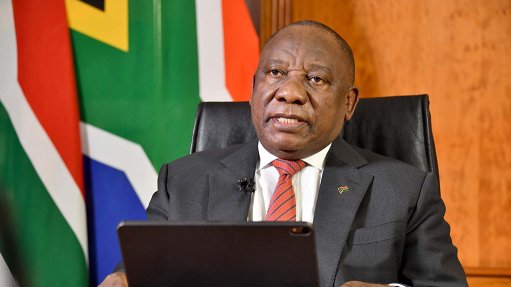Surging municipal water debt threatens stability of entire water value chain
Urgent action is required to arrest South African municipalities’ ever-rising debt to water boards, which has increased 151% since 2019, highlighting a severe financial crisis within the water sector.
As at June 2024, the municipal debt to water boards was R22.36-billion, a significant surge from the R8.91-billion owed as at June 2019 and a rise from R19.03-billion in 2023.
The National Assembly’s Portfolio Committee on Water and Sanitation chairperson Leon Basson says that the long- standing challenge had long been discussed and urgent action was now unavoidable because of the impact of the debt on the entire water value chain.
Some boards, such as Vaal Central Water and Magalies Water, are in dire financial straits owing to nonpayment by municipalities and face possible bankruptcy in the next six to 12 months, as they do not have sufficient cash resources to pay for their operating activities and for their raw water.
In 2022, Sedibeng Water Board went bankrupt owing to municipal debt and was dissolved when it could no longer pay salaries or purchase chemicals, with its geographical areas, assets and liabilities transferred to Vaal Central Water and Magalies Water, says Department of Water and Sanitation (DWS) director-general Dr Sean Phillips.
However, the dissolution did not resolve the underlying problem of municipal nonpayment, leading to a rapid deterioration in the financial status of Vaal Central Water and Magalies Water.
Since July, Vaal Central Water has been unable to meet its monthly operational expenses and has stopped paying the DWS for the raw water it purchases.
“On the current trajectory, Vaal Central Water would only be able to continue operating until about May next year,” Phillips said during a meeting with the Water and Sanitation Portfolio Committee in late August.
Magalies Water has also struggled to meet its operational expenses for some time and has not paid the DWS for raw water, with Phillips noting that, on the current trajectory, the water board is projected to run out of funds by June next year.
Other water boards, such as Lepelle Northern Water and Amatola Water, have also reduced their payments to the DWS. While not yet in a critical financial condition, the two boards are experiencing cash flow problems, he explained.
Rand Water and uMngeni-uThukela Water are still in good financial condition, but have started experiencing declining payment levels from municipalities.
Such financial instability threatens to disrupt water services and impact the entire water value chain, including the financial viability of the National Water Resource Infrastructure Agency, Phillips warned.
“It is not all municipalities which are not paying. However, if a water board goes bankrupt and stops functioning, it will stop providing water to all its municipal customers, not just the ones which are not paying.”
He stated that should the two water boards became insolvent, they would need ongoing subsidies from the DWS to prevent total collapse, creating a precedent of expectations of subsidies for all water boards with nonpaying municipal customers.
However, the National Treasury has said that no additional funding is available to subsidise water boards and that any subsidies will have to be funded by reprioritising the existing DWS budget, which will necessitate cuts in other areas, particularly in large infrastructure grant allocations to municipalities.
The DWS has approached the Treasury with a request for a debt relief mechanism, similar to the one the Treasury introduced for Eskom, to write off municipal debts owed to water boards and the debts owed by water boards to the DWS.
The National Treasury agreed to this request, and the conditions for the debt write-off mechanism were currently being finalised, including a primary condition that municipal debts to water boards could only be written off if the municipalities paid their current invoices in full.
The old debts would only be written off incrementally as municipalities established a good payment record for their current invoices.
While this debt write-off mechanism would provide some relief, Phillips cautioned that it would not solve the problems of municipalities that are not paying their current invoices and have indicated that they could not or would not pay in full.
“These municipalities will not be eligible to participate in the debt write-off mechanism.”
Water and Sanitation Minister Pemmy Majodina said that the challenge has been escalated to Cabinet, as municipal debt affects multiple departments.
Accordingly, a coordinated approach involving five departments is being developed to create a strategic plan for addressing the challenges faced by these municipalities and address the municipal debt crisis.
“The development of this approach is being managed by an interministerial committee, and the committee will be informed of Cabinet’s decisions once they are finalised,” she says.
Further, engagements are taking place with provincial governments in the Free State, the North West and the Northern Cape, as well as with municipalities, to find solutions.
The department is working towards resolving disputes over historical debts and has seen progress with municipalities acknowledging their debts and developing payment plans.
While the committee acknowledges the Water and Sanitation Minister’s proactive engagements with provincial governments, water boards and municipalities, the committee believes that engagements without action will spell disaster for communities depending on these water boards.
Article Enquiry
Email Article
Save Article
Feedback
To advertise email advertising@creamermedia.co.za or click here
Comments
Press Office
Announcements
What's On
Subscribe to improve your user experience...
Option 1 (equivalent of R125 a month):
Receive a weekly copy of Creamer Media's Engineering News & Mining Weekly magazine
(print copy for those in South Africa and e-magazine for those outside of South Africa)
Receive daily email newsletters
Access to full search results
Access archive of magazine back copies
Access to Projects in Progress
Access to ONE Research Report of your choice in PDF format
Option 2 (equivalent of R375 a month):
All benefits from Option 1
PLUS
Access to Creamer Media's Research Channel Africa for ALL Research Reports, in PDF format, on various industrial and mining sectors
including Electricity; Water; Energy Transition; Hydrogen; Roads, Rail and Ports; Coal; Gold; Platinum; Battery Metals; etc.
Already a subscriber?
Forgotten your password?
Receive weekly copy of Creamer Media's Engineering News & Mining Weekly magazine (print copy for those in South Africa and e-magazine for those outside of South Africa)
➕
Recieve daily email newsletters
➕
Access to full search results
➕
Access archive of magazine back copies
➕
Access to Projects in Progress
➕
Access to ONE Research Report of your choice in PDF format
RESEARCH CHANNEL AFRICA
R4500 (equivalent of R375 a month)
SUBSCRIBEAll benefits from Option 1
➕
Access to Creamer Media's Research Channel Africa for ALL Research Reports on various industrial and mining sectors, in PDF format, including on:
Electricity
➕
Water
➕
Energy Transition
➕
Hydrogen
➕
Roads, Rail and Ports
➕
Coal
➕
Gold
➕
Platinum
➕
Battery Metals
➕
etc.
Receive all benefits from Option 1 or Option 2 delivered to numerous people at your company
➕
Multiple User names and Passwords for simultaneous log-ins
➕
Intranet integration access to all in your organisation


















